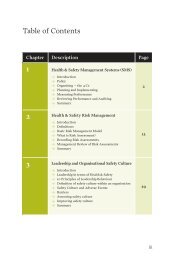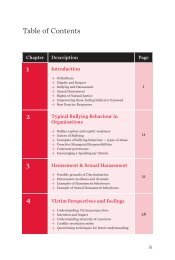Chapter outline Coping with the Initial Shock - Management Briefs
Chapter outline Coping with the Initial Shock - Management Briefs
Chapter outline Coping with the Initial Shock - Management Briefs
You also want an ePaper? Increase the reach of your titles
YUMPU automatically turns print PDFs into web optimized ePapers that Google loves.
As nature abhors a vacuum, people<br />
abhor uncertainty. Despite <strong>the</strong><br />
backdrop of:<br />
> ><br />
> ><br />
> ><br />
continuous and accelerating<br />
change<br />
<strong>the</strong> reality that jobs are not<br />
careers<br />
firms, factories, market<br />
demand and positions do not<br />
last forever<br />
Most of us reduce levels of<br />
insecurity by believing that<br />
redundancy may never happen to<br />
us or it will not happen soon. We<br />
usually look for positive omens<br />
and rationalise that this means our<br />
positions are secure.<br />
Likewise, most managers<br />
underplay <strong>the</strong> threat to<br />
employment mainly because <strong>the</strong>y<br />
are hoping it will not happen;<br />
alternatively <strong>the</strong>y do not want<br />
to face <strong>the</strong> competitive reality<br />
that <strong>the</strong>y will have to deliver<br />
redundancies and <strong>the</strong>n may<br />
actually find <strong>the</strong>mselves in a<br />
redundancy situation. Many<br />
individuals avoid <strong>the</strong> ‘appalling<br />
vista’ of redundancy by denying<br />
<strong>the</strong> facts that <strong>the</strong>y see at work<br />
every day! This means that when<br />
a redundancy is delivered, <strong>the</strong><br />
individual is actually traumatised,<br />
even though <strong>the</strong>y (in <strong>the</strong> logical<br />
part of <strong>the</strong>ir minds) may have<br />
known that this was coming.<br />
The <strong>Initial</strong> Trauma<br />
Our research and experience<br />
tells us that <strong>the</strong> process of being<br />
<strong>Chapter</strong> 2: <strong>Coping</strong> <strong>with</strong> <strong>the</strong> <strong>Initial</strong> <strong>Shock</strong><br />
told that we are in a redundant<br />
situation creates three elements<br />
of deep emotion and emotional<br />
responses:<br />
> ><br />
> ><br />
> ><br />
Grieving/Loss<br />
Why me?<br />
How will <strong>the</strong> firm survive<br />
<strong>with</strong>out me?<br />
We will treat each in turn.<br />
1 Grieving or Loss. The<br />
individual is receiving<br />
seriously bad news and it is<br />
<strong>the</strong>refore natural that <strong>the</strong><br />
grieving process comes into<br />
play. There has been much<br />
research on how humans cope<br />
<strong>with</strong> receiving bad news (much<br />
of this in relation to terminal<br />
illnesses and palliative care).<br />
However, similar principles<br />
apply when <strong>the</strong> bad news<br />
of redundancy arrives. The<br />
delivery of redundancy is a<br />
serious life change and affects:<br />
> > Financial Security: The loss<br />
of a permanent position also<br />
means <strong>the</strong> loss of a flow of<br />
income. This is very serious<br />
as income is essential to fund<br />
life and standard of living.<br />
At a minimum <strong>the</strong> individual<br />
is losing a secure source of a<br />
certain standard of living. This<br />
means that <strong>the</strong>y may have to<br />
reduce <strong>the</strong>ir standard of living.<br />
If <strong>the</strong> individual does not<br />
handle this financial transition<br />
<strong>the</strong>y could lose <strong>the</strong>ir car, home<br />
and have difficulty in educating<br />
and feeding <strong>the</strong>ir family. This<br />
19




